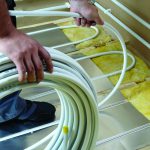Securing planning permission can be an uphill battle, here’s how it’s done and some tips on working with the planners.
In this article we cover:
- Who needs planning permission for what in Ireland
- What is full planning permission (FPP) in Ireland and what’s the process
- What is outline planning permission (OPP) in Ireland and what’s the process
- Do you need OPP first?
- How much it costs
- Timescale
- Appeals process
- What is retention and how to apply
Who needs planning permission?
Those building a new house need planning permission, and those extending or who are changing the use of their house (e.g. garage converted to workshop for business use) may require permission. Even a small change to the front of the house generally requires planning permission, with the exception of small porches. Always check whether your project requires permission before proceeding.
What’s the Full Planning Permission (FPP) process?
For Full Planning Permission (FPP) in NI in the first instance you should contact the Council Planning Department who will help you to determine what type of permission you need and the relevant forms. Completed forms plus all required documentation and the fee should be sent to your Divisional Planning Office. ROI applicants should also contact the Planning Department of their local authority in the first instance, they will advise on the forms and drawings they require. A lot of this legwork can now be done online.
The list of submissions includes copies of Ordinance Survey maps, site/layout plans, elevations, sections, etc, along with all other supporting documentation such as rights of way. In ROI notification must be published in a local newspaper approved by your local authority for the purpose and a clearly readable site notice erected as well, within two weeks of your application being lodged. The site notice must be kept up for a minimum of five weeks. The process is similar in NI except that the local authority contacts your neighbours for you. With your application you send in form NN1 giving the addresses of all occupiers of adjoining premises that abut the application site. In both ROI and NI a copy of your plans is also placed on the Planning Register for public viewing.
In NI you will require approval of Building Control as well, to whom you will need to send (yet another) set of plans. In ROI you register on the Building Control Management System after you’ve secured FPP. The FPP schedule of events is on the table below.
Do I need to secure Outline Planning Permission first?
No. An outline planning application will tell you whether, in principle, you will be allowed to build/extend/ renovate – this can be useful to obtain before purchasing a site (in NI only as in ROI you must own the site to lodge a planning application) / incurring the costs of a fully worked design. For this you will need to provide information on the siting, layout and ridge height. OPP normally remains valid for three years in both ROI and NI during which time you apply for Approval of Reserved Matters (Detailed Planning Permission) in NI or Consequent Permission in ROI. Work on site can only begin after receiving these or FPP.
‘Always check whether your project requires permission before proceeding…’
How much does it cost?
The cost of an application for FPP for a house in ROI is currently €65 and €34 for an extension or conversion. The fees in NI are: OPP £425, FPP £851, Material Change of Use £692, Extension £285. Additional fees in relation to the cost to the local authority of providing infrastructure for new housing, such as water and sewerage, is set regionally and varies from county to county, but it can be quite substantial (see Summer 2017 issue for more on local development levies for self-builds).
Other fees to consider are administrative such as legal outlays in the case of conveyancing, purchasing of Ordinance Survey maps and other documentation, as well as professional fees.
What is the timescale?
In both NI and ROI you should have a decision or at least communication from the relevant authority within eight weeks of the application being correctly lodged. However it is rarely a simple apply-and-receive process. Nearly every new build design will require amendment with changes suggested by the local authority, or more information required. It is a process of negotiation and clarification.
Therefore obtaining FPP can take months or even years. Failure to provide the correct documentation also delays the process as your application will not be lodged in the system until everything is in place. FPP is valid for five years in both ROI and NI.
What is retention?
If you begin work on site before your plans have been passed you seriously jeopardise your chances of success – a recent case in Co Navan, whereby a couple was given a year to demolish their 588sqm house that was built without planning permission, indicates what kind of penalties can be imposed when the courts deem there was a deliberate intent to ignore the law.
Applying for retention or retrospective approval is really there for genuine cases of ignorance that planning permission was required, i.e. small breaches. When it comes to selling your house, retention will need to be secured on aspects that don’t abide to the plans approved by your local authority.
Appeals
In many instances the grant of planning permission will come with some conditions, which you will have to abide to. If you are not happy with these or the application is rejected, you will be given the reasons and you may appeal the decision within four weeks to An Bord Pleanala (ROI) or within four months to the Planning Appeals Commission (NI).
More tips on how to secure planning permission here.
What the planners want when you’re self-building.
| FPP schedule of events | |
| NI
– Application received, fee receipted. – Application checked, validated, copies sent to statutory consultees e.g. Road & Water Services. – Advertisement placed in local press and/or neighbours notified, representations/objections received. – Site inspected, report prepared. – Report considered by Development Control Group meeting, and opinion on application formed. Most decisions will be delegated to officers, but more contentious ones (usually where there are objections) may be referred to the Planning Committee for decision. – Decision taken, decision notice prepared and issued. Those who made representations/objections notified. | ROI
– Application checked and validated, confirmation sent of receipt. – Application placed on Planning Register in Local Authority offices, also public libraries and certain interest groups. – Site inspection. – Acceptance of representations/objections by other parties. – Decision taken by local authority to grant, refuse or ask for Further Information. If FI is requested, you have six months to provide the information; then the planning authority will make a decision to grant, refuse or ask for Clarification of FI. Then, once the CFI is in, it has to either grant or refuse. Then an appeal can be lodged adding 22 weeks minimum. – Written details of decision sent to applicant and anyone who made representations/objections. |










